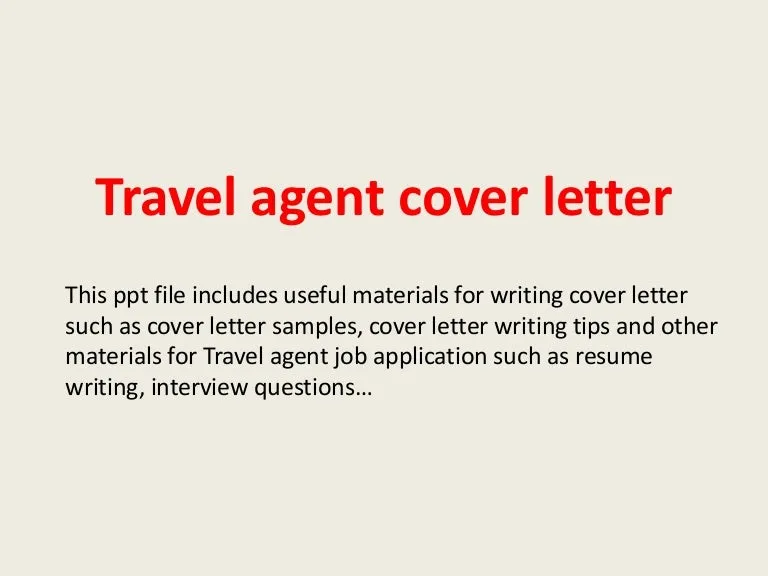Crafting Your Travel Agency Cover Letter
A compelling cover letter is your first impression when applying for a role in a travel agency. It’s an opportunity to showcase your skills, passion, and suitability for the position. A well-crafted cover letter can significantly increase your chances of landing an interview. This guide will walk you through the essential elements of a cover letter, helping you create a document that captures the attention of hiring managers and sets you apart from other applicants. Remember, your cover letter is more than just a formality, it’s a marketing tool. It should be targeted and persuasive, making the employer want to read your resume and invite you for an interview. By understanding the nuances of writing a standout cover letter, you can highlight your unique qualifications and increase your prospects of success in the competitive travel industry.
Essential Elements of a Travel Agency Cover Letter
A strong cover letter comprises several critical elements that work together to create a positive impact. These elements include clear contact information, a professional tone, a detailed description of your skills and experience, and a genuine expression of your passion for travel. Moreover, you must tailor your letter to the specific travel agency you are applying to and proofread it meticulously before submitting. Each aspect of your cover letter plays a significant role in convincing the hiring manager that you are the right candidate. In the following sections, we’ll explore each of these elements, providing you with the tools and insights needed to create an outstanding application.
Contact Information and Header
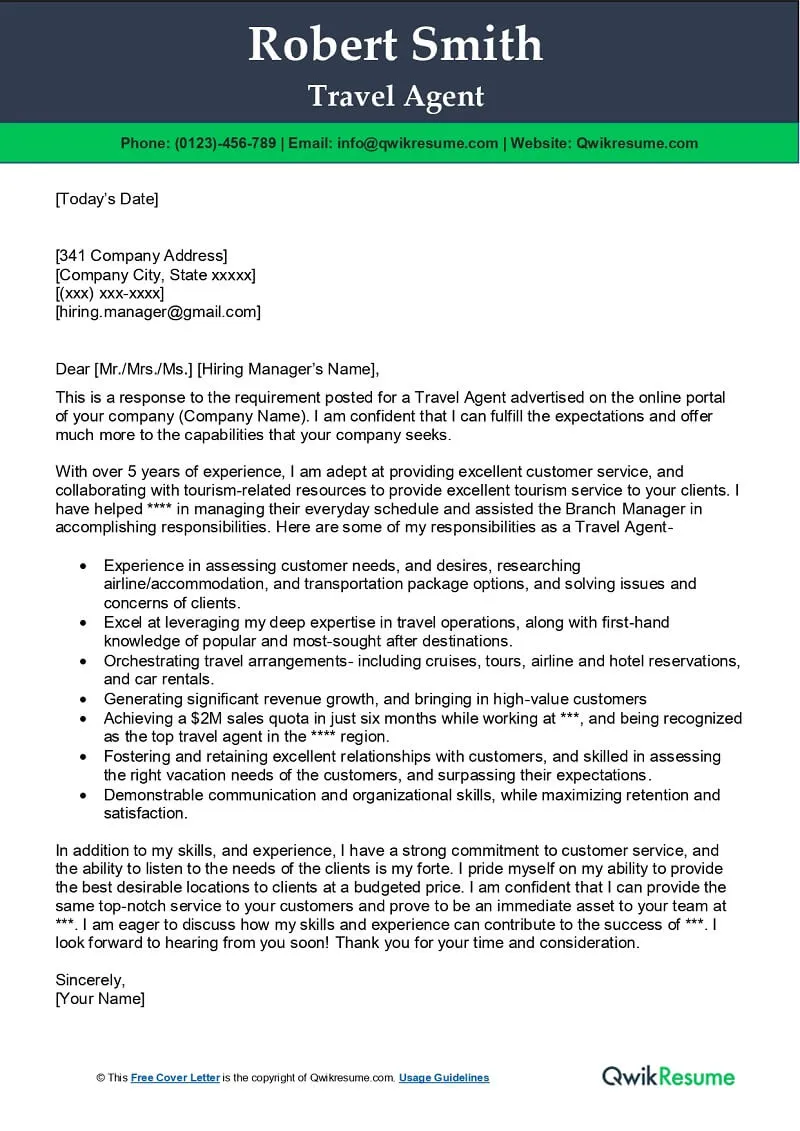
Start your cover letter with a professional header that includes your full name, address, phone number, and email address. Ensure the email address is professional. Following the header, add the date and the hiring manager’s name and title if you know it. Addressing the letter to a specific person demonstrates that you have researched the company and are genuinely interested in the position. This personal touch can make a significant difference. If the hiring manager’s name isn’t available, use a general greeting like ‘Dear Hiring Manager’. Accuracy and attention to detail in this section set a tone of professionalism that will carry through the rest of your letter. Always double-check all the details to ensure there are no typos.
The Importance of a Professional Tone
Maintain a professional and positive tone throughout your cover letter. Avoid using slang, informal language, or overly casual phrasing. Your language should reflect your ability to communicate effectively in a business setting. Show enthusiasm for the role and the travel industry but keep your tone formal and respectful. Use language that is clear, concise, and easy to understand. The tone of your cover letter should reflect the level of professionalism and detail that travel agencies expect from their employees. Always use proper grammar and punctuation. Make sure the letter conveys your professionalism and respect for the opportunity.
Highlighting Your Skills and Experience
Clearly state your relevant skills and experience in your cover letter. Refer to the job description and emphasize the skills and experience most relevant to the role. Include details about your previous travel agency experience, customer service expertise, knowledge of travel destinations, and proficiency in relevant software or booking systems. Quantify your achievements whenever possible by using numbers and data to illustrate your successes. For example, mention how you increased sales, improved customer satisfaction, or managed complex travel arrangements. Highlight your ability to work under pressure, solve problems, and adapt to changing situations. By providing specific examples, you can demonstrate the value you can bring to the travel agency. (cover-letter-skills.webp)
Showcasing Your Passion for Travel
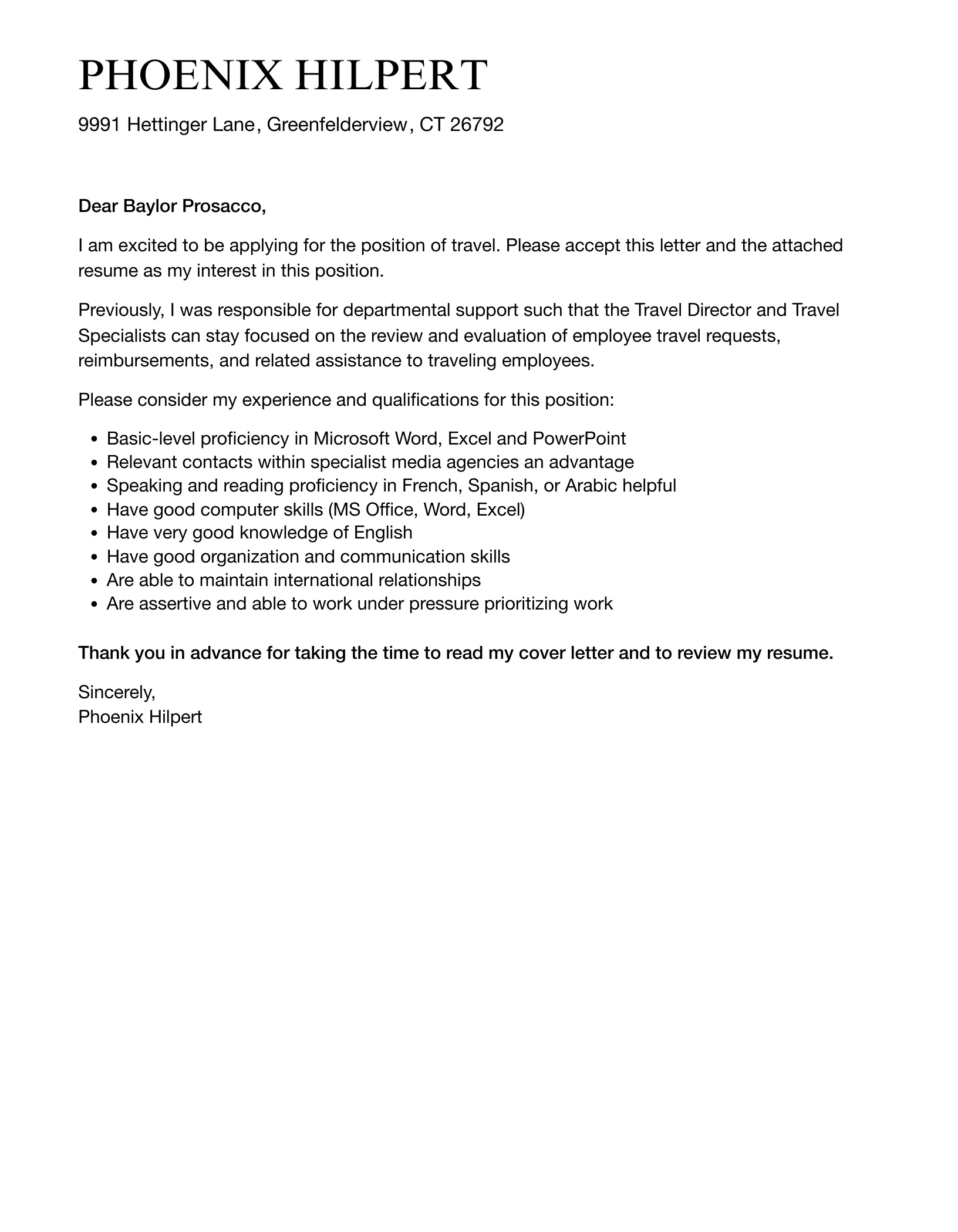
Express your genuine passion for travel in your cover letter. Let your enthusiasm shine through by describing your travel experiences and the aspects of the industry that excite you the most. Show that you are genuinely interested in helping others plan their dream vacations. Share why you love the travel industry and what motivates you to excel in this field. Demonstrate your understanding of the travel industry trends, destinations, and cultural awareness. Your enthusiasm for travel can make you stand out from other candidates, especially if your passion is genuine and well-informed. (travel-agency-passion.webp) Describe the specific destinations you’re passionate about and how you keep up to date with travel industry news and trends.
Tailoring Your Letter to the Agency
Customize your cover letter to each travel agency you apply to. Research the agency’s services, values, and the specific requirements of the job. Mention how your skills and experience align with the agency’s mission and the role’s requirements. Show that you understand their brand and the types of clients they serve. Mention anything specific that attracted you to the agency or the job. Highlighting your knowledge of the agency and tailoring your cover letter demonstrates your genuine interest in the position. (tailoring-cover-letter.webp) Personalize your letter to show that you’ve invested time and effort, making you a more attractive candidate. Tailoring the cover letter is essential to illustrate that you are not just sending a generic application.
Researching the Travel Agency
Before writing your cover letter, conduct thorough research on the travel agency. Visit their website, read reviews, and explore their social media profiles to understand their services, values, and target audience. This research will help you tailor your cover letter to the agency’s specific needs and requirements. Understanding the agency’s focus – whether it’s luxury travel, adventure tours, or budget-friendly options – will allow you to highlight the skills and experiences that are most relevant. Knowing their clientele, the destinations they specialize in, and any recent awards or recognitions will also give you a significant advantage. This preparation helps you demonstrate your genuine interest and make a stronger impression.
Matching Your Skills to the Job Description
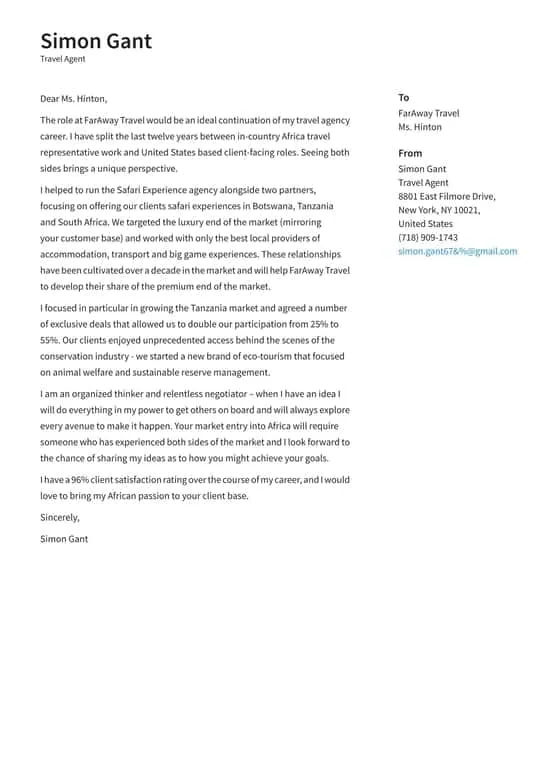
Carefully review the job description and identify the key skills and qualifications required. In your cover letter, directly address how your skills and experience align with these requirements. Use keywords and phrases from the job description to demonstrate that you possess the necessary attributes. Provide specific examples of how you have used these skills in the past, such as customer service, sales, problem-solving, or knowledge of travel destinations. Highlighting your suitability for the role makes it easier for the hiring manager to see that you are a good fit for the position. Showing that you meet the qualifications boosts the employer’s confidence in your potential for success.
Structuring Your Cover Letter
A well-structured cover letter is easy to read and follows a logical flow. The typical structure includes an opening paragraph, body paragraphs, and a closing paragraph. Each section should serve a specific purpose and work together to present a compelling case for why you should be hired. The structure of your cover letter is as important as its content. Ensure that your letter is well-organized and provides a clear narrative of your qualifications. An organized cover letter is far more likely to keep the reader engaged and to create a strong impression. (cover-letter-structure.webp)
Opening Paragraph The Hook
The opening paragraph should immediately capture the reader’s attention. Start by stating the position you are applying for and where you found the job posting. Then, include a brief statement about why you are interested in the role and the travel agency. Make a strong first impression by highlighting your most relevant qualification or a compelling reason why you are a great fit. Your opening should grab the hiring manager’s attention and set the tone for the rest of the letter. Avoid generic openings and aim for a hook that immediately establishes your intent and enthusiasm. A strong start will encourage the reader to continue. State your intentions with clarity and professionalism.
Body Paragraphs Highlighting Achievements
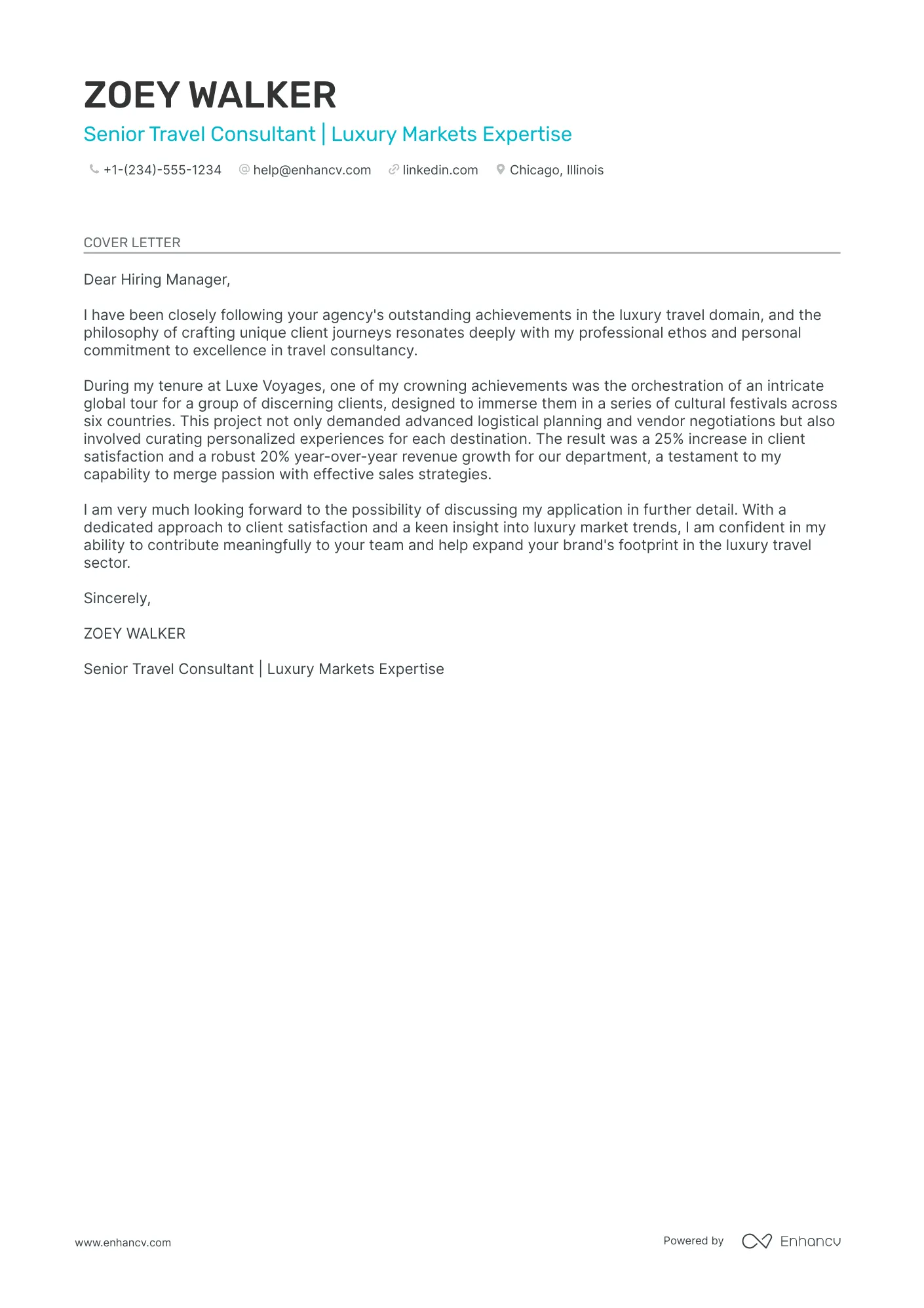
The body paragraphs should provide details about your skills, experience, and achievements. Use this section to expand on the points you mentioned in your opening paragraph. Provide specific examples of how you have used your skills and experiences to succeed. Quantify your accomplishments whenever possible, such as increasing sales, improving customer satisfaction, or managing travel arrangements. Each body paragraph should focus on a specific skill or achievement relevant to the job requirements. Use action verbs to describe your responsibilities and accomplishments, and make sure to demonstrate how your past experiences have prepared you for the role. The goal is to convince the hiring manager of your capabilities. Show how your skills translate to tangible value for the company.
Closing Paragraph Call to Action
In the closing paragraph, reiterate your interest in the position and the travel agency. Thank the hiring manager for their time and consideration. Include a call to action, such as stating that you are available for an interview and look forward to discussing your qualifications further. End with a professional closing, such as ‘Sincerely’ or ‘Best regards,’ followed by your name. Your closing paragraph should leave a lasting positive impression. Remind the reader of your key strengths and reinforce your enthusiasm for the role. Be polite and express your anticipation to hear back from them. Make it easy for the hiring manager to take the next step by providing your contact information.
Proofreading and Editing
Thoroughly proofread and edit your cover letter before submitting it. Check for any grammatical errors, typos, or inconsistencies in your writing. Ensure that your sentences are clear, concise, and easy to understand. Consider having a friend, family member, or career counselor review your cover letter for feedback. A polished and error-free cover letter shows attention to detail and professionalism. It demonstrates that you care about making a positive impression and that you can communicate effectively. (proofreading-cover-letter.webp) Careful proofreading can eliminate errors that might distract the reader or undermine your credibility. Don’t rely solely on spell-check; always read your letter aloud. Ensure that the flow of the letter is natural and all content serves its purpose.
Formatting Your Cover Letter
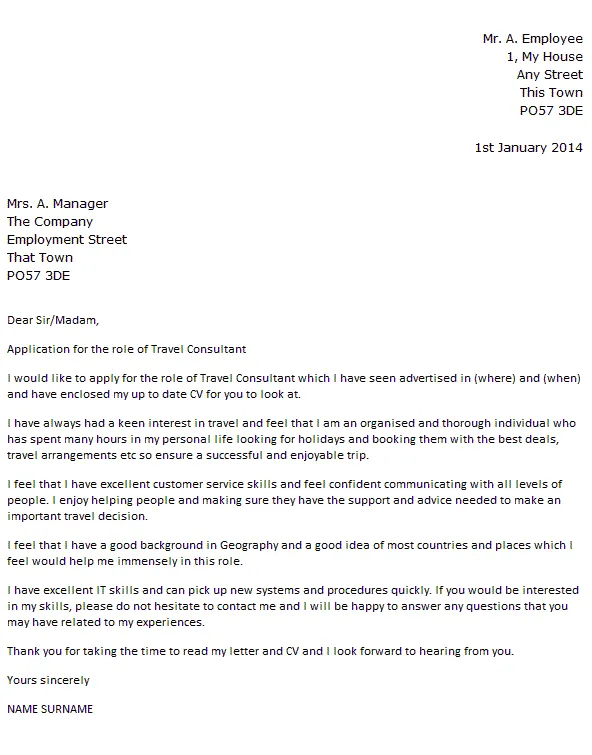
Proper formatting is essential for creating a professional-looking cover letter. This includes choosing a readable font, appropriate font size, and using white space effectively. Well-formatted cover letters are easy to read and visually appealing. Formatting choices can significantly affect the first impression. Ensure that your letter is well-structured and easy to navigate. Use consistent formatting throughout your letter, including font type, size, and spacing. A well-formatted document shows you have attention to detail and respect for the reader. Your formatting should enhance the readability of your cover letter.
Choosing the Right Font and Font Size
Select a professional and readable font, such as Times New Roman, Arial, or Calibri. Use a font size between 10 and 12 points to ensure readability. Avoid using overly stylized or decorative fonts, as they can be difficult to read. The font should be easy on the eyes and convey professionalism. Consistent font use throughout the document is crucial for a clean look. Make sure the chosen font is universally compatible, so your formatting isn’t altered when the document is opened. Select a font that is widely available across different computers and operating systems.
Using White Space Effectively
Use white space to make your cover letter visually appealing and easy to read. Use margins of one inch on all sides and space between paragraphs to separate sections. Break up large blocks of text by using bullet points or short, concise paragraphs. White space helps prevent the document from looking cluttered and makes it easier for the reader to focus on the content. Properly used white space enhances readability and keeps the reader engaged. Consider using a simple layout with clear headings and subheadings. Avoid overcrowding the page. Adequate white space makes the letter look organized and professional.
Best Practices for Submitting Your Cover Letter
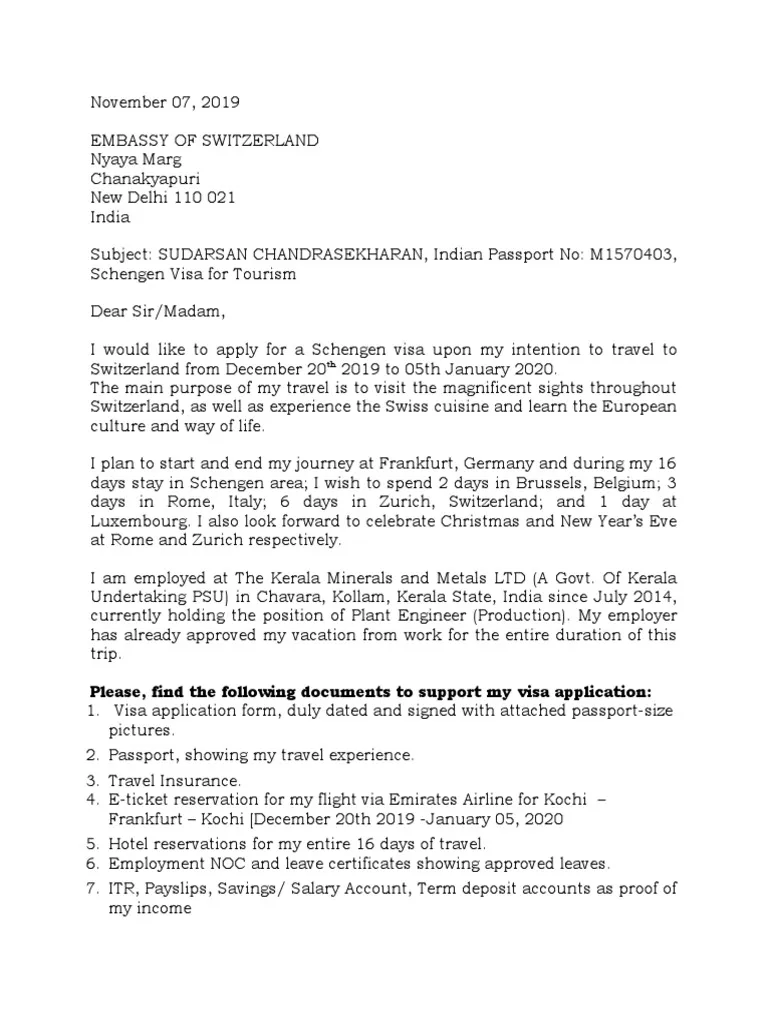
Follow the instructions provided by the travel agency for submitting your cover letter. If the agency requires an online application, carefully upload your cover letter in the specified format, such as PDF or DOCX. If you are sending your cover letter via email, ensure that the subject line is clear and includes the job title. Always attach your cover letter and resume as separate documents. Double-check to make sure all attachments are included before sending your application. Adhering to these best practices will ensure that your application is considered professionally. (cover-letter-submit.webp) Make sure the file names are clear and professional. Confirm that all documents open correctly to avoid any issues. Following these steps helps you to prevent application errors and increases your chances of success.
By following these guidelines, you can create a compelling cover letter that will help you stand out in the competitive travel industry. Good luck with your job search!
